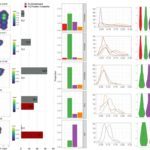Link to Pubmed [PMID] – 26542370
Carcinogenesis 2016 Jan;37(1):39-48
Multidrug resistance 2 (Mdr2), also called adenosine triphosphate-binding cassette B4 (ABCB4), is the transporter of phosphatidylcholine (PC) at the canalicular membrane of mouse hepatocytes, which plays an essential role for bile formation. Mutations in human homologue MDR3 are associated with several liver diseases. Knockout of Mdr2 results in hepatic inflammation, liver fibrosis and hepatocellular carcinoma (HCC). Whereas the pathogenesis in Mdr2 (-/-) mice has been largely attributed to the toxicity of bile acids due to the absence of PC in the bile, the question of whether Mdr2 deficiency per se perturbs biological functions in the cell has been poorly addressed. As Mdr2 is expressed in many cell types, we used mouse embryonic fibroblasts (MEF) derived from Mdr2 (-/-) embryos to show that deficiency of Mdr2 increases reactive oxygen species accumulation, lipid peroxidation and DNA damage. We found that Mdr2 (-/-) MEFs undergo spontaneous transformation and that Mdr2 (-/-) mice are more susceptible to chemical carcinogen-induced intestinal tumorigenesis. Microarray analysis in Mdr2-/- MEFs and cap analysis of gene expression in Mdr2 (-/-) HCCs revealed extensively deregulated genes involved in oxidation reduction, fatty acid metabolism and lipid biosynthesis. Our findings imply a close link between Mdr2 (-/-) -associated tumorigenesis and perturbation of these biological processes and suggest potential extrahepatic functions of Mdr2/MDR3.







